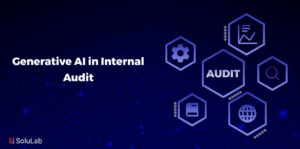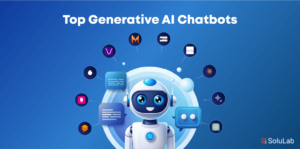Gen AI in Supply Chain Management
Generative AI (Gen AI) is transforming the supply chain industry by revolutionizing how companies predict demand, optimize logistics, and manage supplier relationships. By leveraging advanced algorithms, Gen AI can generate new insights and solutions from existing data, enabling more accurate forecasting, streamlined operations, and enhanced decision-making. This technology empowers supply chain managers to respond dynamically to disruptions, reduce costs, and improve efficiency, making it a critical tool for maintaining competitiveness in a fast-paced global market.





Adoption Rate
45% of companies in supply chain management have adopted AI technologies

Market Share
40% market

Clients
Around 600,000 businesses globally are using AI to enhance their supply chain operations

Efficiency Increase
AI solutions in supply chains has led to a 25% increase in operational efficiency

Projected Saving
$700 billion in annual savings by 2030
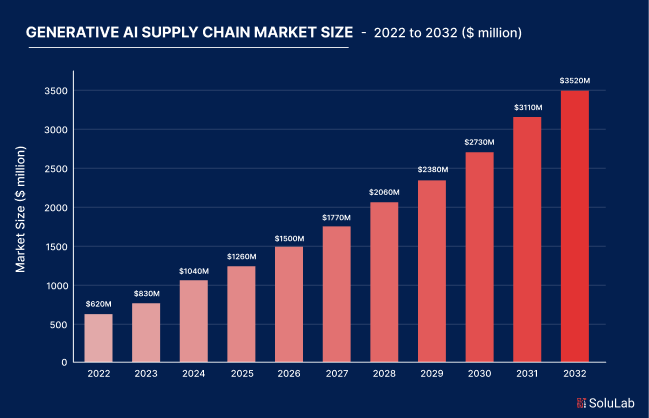
Industry Overview
The supply chain industry is experiencing a profound transformation driven by the integration of Generative AI (Gen AI) technologies. This shift is influenced by the need for greater efficiency, flexibility, and resilience in the face of global disruptions such as pandemics, natural disasters, and geopolitical tensions. Gen AI is becoming a crucial tool for supply chain managers, enabling them to optimize operations and stay competitive in an increasingly complex and fast-paced environment.
Current Landscape
The supply chain industry is undergoing a significant transformation driven by the adoption of advanced technologies such as artificial intelligence, blockchain, and the Internet of Things (IoT). Generative AI, a specialized branch of AI, is playing an increasingly pivotal role in reshaping supply chain management by enabling the creation of new data, scenarios, and predictive models.
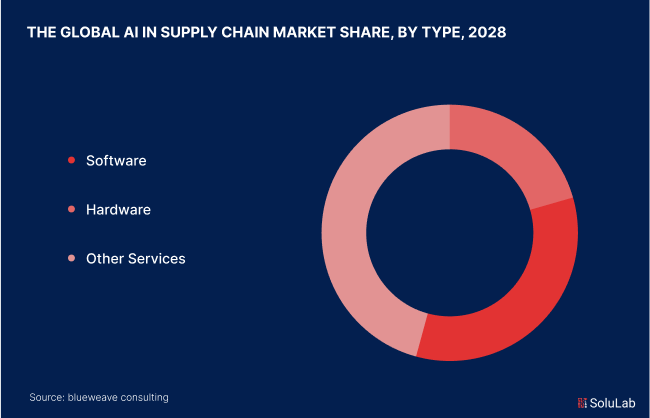
Industry Challenges
Innovation and Digital Transformation
Legacy Systems
Many supply chains still rely on outdated legacy systems that are not easily compatible with advanced Gen-AI technologies. Upgrading these systems is both costly and time-consuming.

Integration Difficulties
Incorporating Gen-AI into existing supply chain operations requires seamless integration with other technologies like IoT, blockchain, and ERP systems, which can be complex and resource-intensive.
Demand Forecasting and Inventory Management

Accuracy in Predictions
While Gen-AI can significantly improve demand forecasting, ensuring the accuracy of these predictions in volatile markets is challenging. Factors like sudden shifts in consumer behavior or unexpected disruptions can reduce the reliability of AI models.
Inventory Optimization
Optimizing inventory levels using Gen-AI requires precise data inputs and real-time updates, which can be difficult to maintain across global supply chains with varying data quality.
Operational Inefficiencies

Complexity in Supply Chain Networks
Supply chains often involve multiple stakeholders, from suppliers to manufacturers to distributors. Coordinating these parties effectively using Gen-AI solutions can be challenging, particularly when dealing with complex, global networks.
Lack of Real-Time Data
The effectiveness of Gen-AI in improving operational efficiency depends on the availability of real-time data. However, many supply chains struggle to achieve the level of data integration and visibility required.
Risk Management

Supply Chain Disruptions
Gen-AI models must be resilient enough to predict and adapt to supply chain disruptions, such as natural disasters, geopolitical tensions, or pandemics. Ensuring that AI models can handle these unpredictable events is a significant challenge.

Dependency on Data Accuracy
The effectiveness of risk management using Gen-AI heavily relies on accurate and complete data. Inaccurate data can lead to poor decision-making and increased vulnerability to risks.
Increasing Regulatory Compliance and Oversight

Compliance with International Standards
Supply chains must comply with a variety of international regulations and standards, which can vary widely by region. Ensuring that Gen-AI systems adhere to these diverse regulations is complex.
Data Privacy Concerns
As Gen-AI models process vast amounts of sensitive data, ensuring compliance with data privacy laws, such as GDPR, becomes a critical challenge for supply chain operators.
Evolving Cyber Threats

Increased Attack Surface
The integration of Gen-AI into supply chains expands the attack surface for cyber threats. Protecting AI models and the data they process from cyberattacks is a top priority.

Security of AI Systems
Ensuring the security of AI models themselves is challenging, particularly when dealing with adversarial attacks designed to exploit vulnerabilities in AI algorithms.
Maximize Your Supply Chain Potential!
Experience the next generation of supply chain management with our advanced Generative AI solutions.
Need for Gen AI in Supply Chain

Enhanced Accuracy
Gen AI models can process complex datasets, including historical sales data, market trends, and external factors like weather patterns, to generate more accurate demand forecasts. These models continuously learn and adapt to new data, improving their predictions over time.
Scenario Planning
Gen AI can simulate various market scenarios to help supply chain managers prepare for potential disruptions. By modeling different outcomes, AI provides insights into how changes in demand, supply chain disruptions, or economic shifts might impact operations.

Reduced Overstock and Stockouts
With more accurate demand forecasts, companies can reduce the risk of overstocking or running out of stock, both of which can have significant financial implications. Gen AI helps maintain optimal inventory levels, reducing costs and improving customer satisfaction.

Automated Process Optimization
Gen AI can identify inefficiencies in supply chain processes and suggest improvements. For example, AI can optimize routing for logistics, reducing transportation costs and delivery times. It can also automate the scheduling of manufacturing processes to maximize productivity.

Enhanced Supply Chain Visibility
AI systems provide real-time visibility into the entire supply chain, from raw material sourcing to final delivery. This visibility enables better decision-making, as managers can quickly identify and address potential issues before they escalate.

Dynamic Supply Chain Management
Gen AI enables supply chains to be more responsive and adaptable to changes in demand, supply disruptions, or other external factors. AI-driven systems can automatically adjust procurement, production, and distribution plans to optimize overall performance.
Real-Time Inventory
Tracking
Gen AI systems can continuously monitor inventory levels across multiple locations, providing real-time updates and alerts. This allows supply chain managers to quickly respond to changes in demand or supply chain disruptions, reducing the risk of stockouts.
Predictive Inventory Optimization
By analyzing historical data and current trends, Gen AI can predict future inventory needs with greater accuracy. This helps companies maintain optimal inventory levels, reducing the costs associated with overstocking or understocking.

Automated Replenishment
Gen AI can automate the replenishment process by predicting when stock levels will fall below a certain threshold and triggering automatic orders. This reduces the need for manual intervention and ensures that inventory is always available when needed.
Risk Prediction and Mitigation
Gen AI uses predictive analytics to identify potential risks before they materialize. By analyzing historical data and current market conditions, AI can forecast risks such as supplier delays, transportation disruptions, or demand fluctuations.
Supply Chain Simulation
Gen AI can simulate various risk scenarios, allowing supply chain managers to understand the potential impact of different events on their operations. This enables better preparation and more effective contingency planning.

Real-Time Risk Monitoring
AI systems provide continuous monitoring of risk factors across the supply chain, enabling real-time risk assessment and quicker responses to emerging threats. This helps minimize disruptions and maintain smooth operations.

Improved Supplier Communication
Gen AI can automate and streamline communication with suppliers, ensuring that all parties are on the same page regarding orders, deliveries, and production schedules. This reduces the risk of misunderstandings and delays.
Transparent Supplier Performance Tracking
AI systems can continuously monitor supplier performance, providing insights into key metrics such as delivery times, quality, and reliability. This transparency helps companies identify potential issues and take corrective action before they impact the supply chain.

Dynamic Supplier Relationship Management
Gen AI enables more dynamic management of supplier relationships by analyzing data on supplier performance, market conditions, and contract terms. This allows companies to make informed decisions about supplier selection, negotiation, and collaboration.

Optimized Resource Utilization
Gen AI can analyze data on resource consumption and production processes to identify opportunities for reducing waste and improving efficiency. This helps companies minimize their environmental impact while also reducing costs.
Use Cases of Gen AI in Supply Chain

Predictive Demand Forecasting
Gen AI analyzes historical sales data, market trends, and external factors such as seasonality and economic indicators to predict future demand with high accuracy. This helps companies maintain optimal inventory levels, reducing the risk of overstocking or stockouts.

Dynamic Inventory Optimization
AI-driven systems can continuously monitor inventory levels in real time and automatically adjust stock levels based on demand forecasts. This ensures that companies always have the right amount of stock on hand, minimizing holding costs and reducing the likelihood of stockouts.
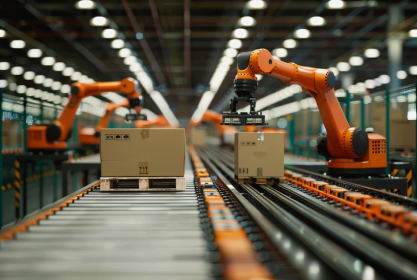
Automated Replenishment
Gen AI can automate the replenishment process by predicting when inventory levels will fall below a certain threshold and triggering automatic orders. This reduces manual intervention, improves efficiency, and ensures that inventory is always available when needed.
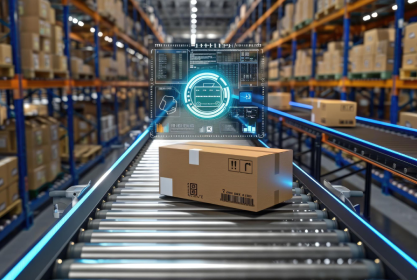
Warehouse Automation
Gen AI can automate warehouse operations, including picking, packing, and sorting of goods. AI-powered robots and automated systems increase the efficiency and accuracy of warehouse operations, reducing labor costs and minimizing errors.

Automated Supplier Evaluation
Gen AI systems can continuously monitor and evaluate supplier performance based on key metrics such as delivery times, quality, and cost. This data-driven approach enables companies to make informed decisions about supplier selection and negotiation.

Supply Chain Collaboration
AI-driven platforms facilitate better communication and collaboration with suppliers, ensuring that all parties are aligned on production schedules, delivery timelines, and quality standards. This reduces the risk of misunderstandings and delays.

Predictive Risk Assessment
Gen AI can assess the risk of supplier disruptions by analyzing historical data and current market conditions. This enables companies to proactively manage risks and develop contingency plans, ensuring that supply chain operations remain uninterrupted.

Predictive Risk Analytics
Gen AI can analyze historical data, market conditions, and geopolitical events to predict potential risks, such as supplier failures or transportation disruptions. This allows companies to take preventive measures before these risks materialize.

Real-Time Fraud Detection
Gen AI can analyze transaction data in real time to detect fraudulent activities that deviate from established patterns. This allows companies to take immediate action to prevent fraud and protect their assets.

Enhanced Supply Chain Security
AI systems can monitor the entire supply chain for potential security threats, such as unauthorized access to sensitive data or tampering with goods. This ensures that supply chain operations remain secure and reliable.

Blockchain Integration for Traceability
Gen AI can be integrated with blockchain technology to enhance traceability and security in the supply chain. This ensures that all transactions and movements of goods are recorded and verified, reducing the risk of fraud and counterfeiting.
Boost Your Supply Chain Performance!
Experience the next generation of supply chain management with our advanced Generative AI solutions.
Benefits of Gen AI in Supply Chain

Increased Accuracy
Gen AI enhances demand forecasting through real-time data analysis and machine learning, reducing forecast errors and allowing for more accurate inventory planning. By integrating data from various sources—such as historical sales, weather patterns, and economic indicators—AI can identify subtle trends that impact supply and demand, resulting in better stock management and reduced overstock or stockout situations.

Innovative Solutions
Gen AI fosters innovation in supply chain management by identifying inefficiencies and recommending process improvements. By analyzing vast datasets across the supply chain, AI can pinpoint bottlenecks, optimize logistics routes, and suggest changes to procurement strategies. This leads to faster delivery times, reduced costs, and enhanced overall efficiency.

Cost Reduction
Gen AI automates various supply chain tasks, such as order processing, inventory management, and supplier communications. Through the application of machine learning and natural language processing (NLP), routine tasks are streamlined, reducing the need for manual labor and cutting operational costs.

Enhanced Customer Experience
Gen AI enhances customer experience by improving the efficiency and accuracy of order fulfillment. AI-driven demand forecasting ensures that products are readily available, reducing wait times and backorders. This leads to higher customer satisfaction and repeat business.

Virtual Assistance
AI-powered systems also enable personalized customer service. Chatbots and virtual assistants can assist customers in tracking orders, handling returns, and addressing inquiries promptly and accurately. By providing round-the-clock support and personalized service, AI enhances the overall customer experience and strengthens brand loyalty.
Future Trends
Integration with Quantum Computing
The integration of Gen AI with quantum computing holds the potential to transform the supply chain industry. Quantum computing offers exponentially faster data processing and the ability to handle highly complex computations, which can revolutionize supply chain operations, including logistics optimization, demand forecasting, and real-time decision-making
Quantum Computing and Gen AI Integration: By combining quantum computing with Gen AI, companies are able to process and analyze vast amounts of supply chain data—such as supplier performance, demand signals, and transportation logistics—far faster than traditional computing systems. This enhanced processing power will allow for more precise predictions and optimizations, leading to significant improvements in supply chain efficiency and resilience.
Supply Chain Optimization: Quantum-enhanced AI can dramatically improve supply chain optimization by rapidly analyzing complex logistics networks, including transportation routes, warehouse locations, and inventory levels. Quantum computing could help solve intricate optimization problems
Risk Management and Resilience: In the area of risk management, the combination of Gen AI and quantum computing will allow for real-time risk assessment and contingency planning. Quantum algorithms could simulate numerous "what-if" scenarios related to supply chain disruptions, such as natural disasters, geopolitical instability, or sudden demand spikes. By evaluating these complex scenarios quickly, companies will be able to identify risks earlier, deploy countermeasures more effectively, and build more resilient supply chains.Blockchain and AI Synergies in Supply Chain
Combining AI with Blockchain Enhances Supply Chain Security, Ensures Transaction Integrity, and Streamlines Compliance
Enhanced Security: Blockchain’s decentralized, tamper-proof ledgers combined with AI’s advanced monitoring capabilities can significantly improve security across the supply chain. Blockchain ensures that every transaction and piece of data, such as inventory records or shipping details, is securely stored and immutable. When integrated with AI, this system becomes even more powerful: AI algorithms can continuously monitor blockchain-based supply chain transactions in real time, flagging unusual patterns or potential security breaches.
Securing Transactions: In supply chain management, secure transactions are critical for ensuring that goods, payments, and data move smoothly through the various stages of production and delivery. Blockchain technology secures these transactions by recording every step transparently and ensuring that no data can be altered once it is added to the ledger. This transparency provides an audit trail that can be invaluable for compliance, dispute resolution, and fraud prevention.Predictive Analytics in Customer Insights
AI-Driven Predictive Analytics Will Enable Supply Chains to Anticipate Demand Fluctuations, Optimize Inventory, and Enhance Supplier Relationships
Demand Forecasting and Inventory Management: Traditional supply chain planning often relies on historical data and broad assumptions about market conditions. Gen AI takes demand forecasting to the next level by analyzing individual factors that impact demand, such as seasonal trends, customer preferences, and external disruptions. This allows supply chain managers to predict future demand with greater accuracy, enabling them to adjust inventory levels accordingly.
AI-Driven Predictive Analytics: Gen AI enhances predictive analytics in supply chains by leveraging advanced machine learning algorithms and large datasets to forecast demand, optimize logistics, and improve supplier performance. By continuously analyzing data from multiple sources, such as sales history, weather patterns, and economic indicators, AI provides valuable insights that enable companies to anticipate changes in supply and demand, reduce inefficiencies, and make more informed decisions.Transform Your Supply Chain with Generative AI
In today's fast-paced world, staying competitive in supply chain management requires innovation. Generative AI presents a transformative opportunity for businesses, offering enhanced operations and a competitive edge. Now is the perfect time to integrate this emerging technology into your strategy for a smooth transition. At SoluLab, we offer customized Generative AI solutions for supply chain management, including inventory optimization, demand forecasting, supplier selection, logistics planning, and real-time tracking. Our tools are designed to streamline your supply chain, cut costs, and boost efficiency. Ready to elevate your supply chain operations? Contact us or book a demo today to explore how our AI solutions can be tailored to your needs!

Latest Blogs
How Generative AI Enhances Internal Audit Processes?
From predictive analytics to fraud detection, see how Generative AI redefines internal audit practices for unmatched efficiency and accuracy.
Read MoreWhat is a GAN? – Generative Adversarial Networks Guide
Learn the fundamentals of Generative Adversarial Networks and explore their groundbreaking applications in image generation, AI, and more.
Read MoreTop 10 Generative AI Chatbots in 2024
Discover the top 10 generative AI chatbots in 2024, leading innovation in customer service, automation, and personalized experiences.
Read More

